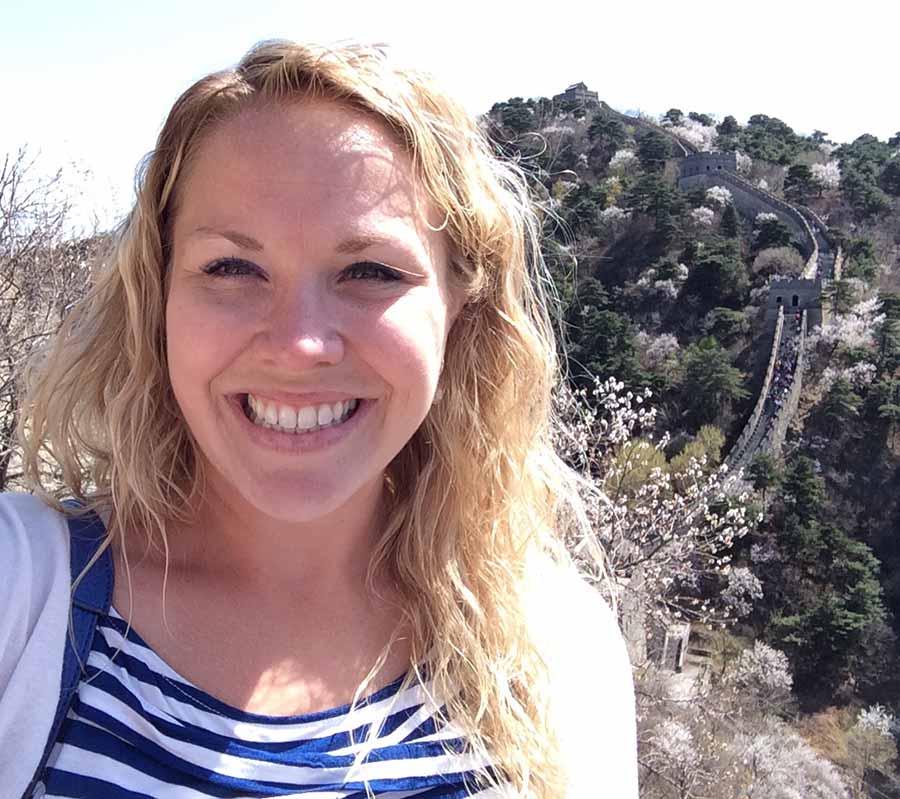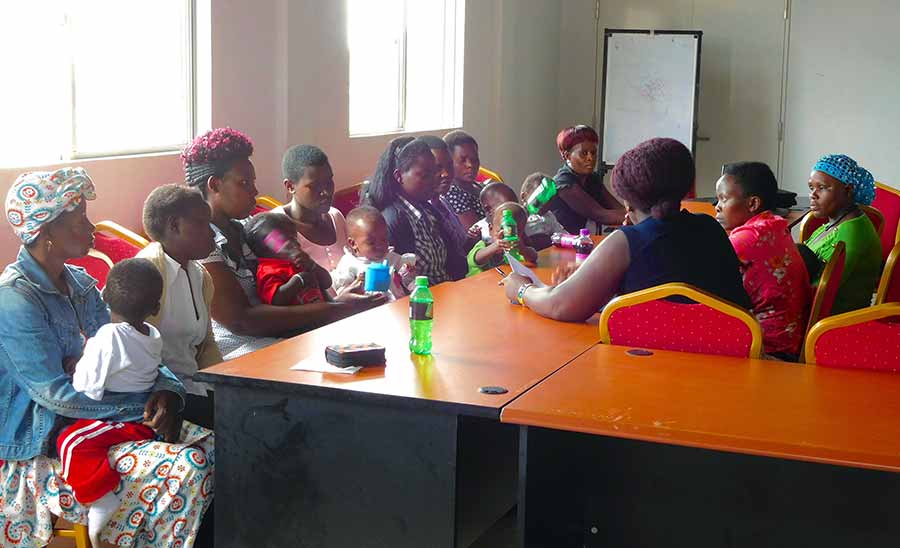Frontiers of Innovation Fellows to Showcase Research Addressing Global Challenges at Symposium
November 19, 2015 / By Erika Johnson
San Diego, Nov. 19, 2015 — After a study abroad trip to Tanzania as an undergraduate, Julie Bergmann knew that she wanted to pursue a career in public health. Now a doctoral candidate in global health at UC San Diego, Bergmann is conducting research in Uganda to assess health care barriers for HIV-exposed infants. Bergmann is part of the inaugural UC San Diego Frontiers of Innovation Scholars Program cohort and will present her research at the first annual FISP Symposium on Friday, Nov. 20.

The Frontiers of Innovation Scholars Program, led by the UC San Diego Office of Research Affairs, is a campus-wide effort to support the primary research initiatives of the Strategic Plan. The program began last year and provides funding to support postdocs and students who are conducting socially beneficial research as well as scholars who are working to launch large-scale, multidisciplinary research-center applications.
Several affiliates of the UC San Diego Qualcomm Institute will participate in the FISP Symposium. Panel sessions will be led by a number of QI-affiliated faculty, including Stuctural Engineering Prof. Falko Kuester ("Exploring the Basis of Human Knowledge, Learning and Creativity"), Visual Arts Prof. Sheldon Brown ("Enriching Human Life and Society") and the Institute for Neural Computation's Dr. Leanne Chukoskie ("Exploring the Basis of Human Knowledge, Learning and Creativity"). In addition, QI Public Information Representative Tiffany Fox wil speak at one of the Symposium's Professional Development Sessions on "Effective Communications in Multi-disciplinary Teams."
Several undergraduate, graduate, Ph.D. and postdoctoral scholars affiliated with QI will also present talks and posters, including students mentored by Kuester, Brown and a number of other QI faculty -- Prof. Ryan Kastner (Computer Science and Engineering), Prof. Liangfang Zhang (Nanoengineering), Prof. Todd Coleman (Bioengineering), Dr. Rommie Amaro (Chemistry), Prof. Tajana Rosing (Computer Science), Prof. Alon Orlitsky (Electrical Engineering), Prof. Thomas Levy (Anthropology), Prof. Patrick Mercier (Electrical and Computer Engineering), Prof. Jennifer Burney (International Relations and Pacific Studies) and Truong Nguyen (Electrical and Computer Engineering). QI Principal Design Engineer Curt Schurgers and Special Projects Coordinator Dominique Rissolo also mentored students who are participating in the Symposium.
The students include:
- Sebastian Afshari (Aerospace Engineering)
- Miguel de Villa (Mechanical and Aerospace Engineering)
- Ian Dickeson (Structural Engineering)
- Quentin Gautier (Computer Science and Engineering)
- Nathan Hui (Electrical Engineering)
- Byeong Keun Kang (Electrical and Computer Engineering)
- Diego Mesa (Bioengineering)
- Dominique Meyer (Physics)
- Jorge Pacheco (Computer Engineering)
- Bryn Taylor (Biomedical Sciences)
- Soracha Thamphiwatana (Nanoengineering)
- Sabrina Trinh (Electrical Engineering)
- Jagannathan Venkatesh (Computer Science)
- Nathan Wade (Arthur C. Clarke Center for Human Imagination)
- Antonella Wilby (Computer Science)
Approximately $2.7 million in fellowships were awarded to 168 trainees in the 2014-15 academic year. Postdoctoral scholars and Ph.D. students were awarded up to $25,000 each, while undergraduate students were awarded $3,000 each, with the funding going to projects led by principal investigators. The program is open to all fields of study, with priority given to research projects that align with the campus’ four grand research themes: understanding and protecting the planet; enriching human life and society; exploring the basis of human knowledge, learning and creativity; and understanding cultures and addressing disparities in society. Preference is also given to those proposals that have a collaborative focus, employ novel approaches and foster commitments to diversity and access.
By-the-Numbers: Frontiers of Innovation Scholars Program
Proposals submitted for possible funding in 2015/16 year
186: Total graduate proposals submitted
86: Total post-doc proposals submitted
77: Total undergraduate proposals submitted
2014/15 year
168: Total number of fellowships awarded in 2014/15 academic year
$2.7M: Approximate amount of award funding provided in 2014/15 academic year
$25,000: Award amount for each postdoctoral scholar and graduate student
$3,000: Award amount for undergraduate students, with funding going to projects led by principal investigators
“It’s gratifying to see so many young scientists and scholars engaged in creative and innovative research projects made possible by the Frontiers of Innovation Scholars Program,” said Vice Chancellor for Research Sandra Brown. “Our university’s multidisciplinary research enterprise benefits from the expanded opportunities the program provides, and our undergraduate and graduate students are finding solutions to some of the world’s most challenging problems.”
The inaugural event, organized by UC San Diego Academic Enrichment Programs, is designed to recognize the scholarly work of the fellows as well as offer an opportunity for the group to interact as peers and develop communication skills. The symposium is free and open to all, and will take place from 8 a.m. to 5 p.m. in Price Center. The day will include poster sessions, small groups of oral presentations organized by discipline as well as professional development workshops including grant writing, effective mentor-mentee relationships and more.
“Our hope is that the research and symposium experience will encourage these research trainees to build on multidisciplinary projects by developing their ability to communicate and collaborate with those in very different disciplines,” said David Artis, dean of Undergraduate Research Initiatives and director of Academic Enrichment Programs.
The program provides postdocs and Ph.D. students with the opportunity to work with mentors from at least two divisions. Bergmann is collaborating with an economics professor from the UC San Diego School of Global Policy and Strategy who has experience in Sub-Saharan Africa, an area of expertise relevant to her research.
“The fellowship has impacted my work immensely; it’s allowed me to carry out a study in a different country,” said Bergmann. “In addition to the financial benefits, the program has enabled me to conduct multidisciplinary work with the support of mentors who have the expertise I need to successfully complete my research.”

Bergmann is currently working at three sites in Uganda to assess HIV-exposed infant access to care. Her research will then be used to create an intervention to reduce incidences of maternal HIV transmission.
“Since about a fifth of all new HIV infections in Uganda are a result of mother-to-child transmission, the only way to end the pediatric epidemic is to understand the social and economic barriers that prevent mothers from receiving the care they need to avoid transmission to their children,” said Bergmann.
Bergmann has always been interested in the field of health. As an undergraduate, she helped collect health indicator information from remote villages in Tanzania and reported back to the Ministry of Health. She so loved the experience that she decided to pursue a career in public health. She obtained a master’s degree in international health from Johns Hopkins Bloomberg School of Public Health and is now a third year doctoral student at UC San Diego. Her goal is to help increase access to health care for women and children among vulnerable populations.
The Frontiers of Innovation Program Symposium is supported by the Office of the Chancellor and the Office of Research Affairs, in association with Academic Affairs, Student Affairs, and the Graduate Division. The conference is planned and coordinated by Academic Enrichment Programs, which provides research-oriented preparation for undergraduates of all majors as well as assistance in applying for scholarships, fellowships and graduate or professional school.
For more information about the symposium, click here.
Related Links
Frontiers of Innovation Scholars Program (FISP) Symposium
Media Contacts
Tiffany Fox, (858) 246-0353, tfox@ucsd.edu

